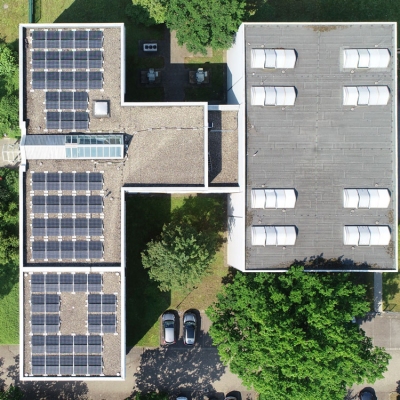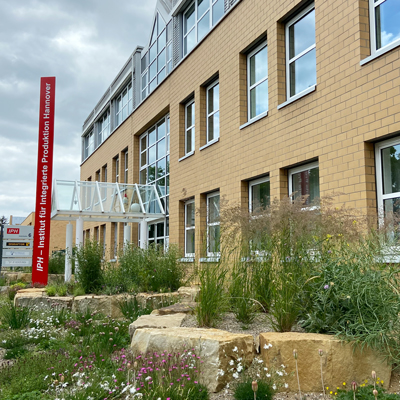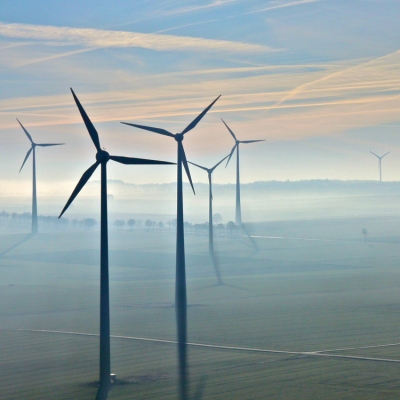Our aim is to create a resource-friendly work environment. This is why IPH counts on green IT, an energy-efficient heating system – and generates power using our own solar system installed on top of the roof. Moreover, IPH does research on ecological topics.
Green energy

To keep our energy loss as low as possible, the IPH building has been equipped with windows with insulated glazing. Since 2016, we have also been using a smart, energy-efficient heating system. Our staff can regulate the heating in their offices individually while they are out on business. In addition, the self-regulating heating shuts down automatically outside working hours.
For the generation of power, we count on solar energy: Since July 2019, we are using a 39-kWp solar system installed on top of the institute's roof.
Nature-friendly front garden

Habitat for insects and microorganisms is provided by the IPH's front garden, which was redesigned at the end of 2021.
Low, evergreen perennials grow here. In between, there are several islands of sandstone blocks that have been planted in different ways. The diverse native plants bloom rather inconspicuously, but provide a large food spectrum for insects. Microorganisms find shelter between the stones and in deadwood logs.
We invested €34,883.32 in the nature-friendly redesign of the front garden. On the basis of four requests for proposals, we selected one provider from two received offers and commissioned the gardening and landscaping company Hofmann & Leyhe UG from Sehnde with the implementation.
Green IT

At IPH, our aim is to implement as many aspects of the so-called "Green IT" as possible like the sustainable use of our information and communication equipment over the whole life cycle. For example, our monitors switch off automatically when they are not used anymore, and we reduce the number of unnecessary printouts by converting documents like holiday applications or travel authorization requests into digital form. Our aim is to work almost completely paperless.
Moreover, we use our equipment longer than foreseen by the original life cycle and give attention to resource-friendly planning when purchasing further IT equipment. As to the disposal of IT equipment, our intention is to proceed in a preferably energy-saving way and recycle all equipment or parts of it.
Research for sustainable production

Sustainability and efficiency are the goal of many of our research projects. We help companies to improve their eco-balance and save energy costs by optimising their production management and storing power from renewable sources. In production technology, we count on energy and material efficiency. For example, we contribute to develop energy-efficient melting furnaces as well as lightweight construction processes which reduce the power consumption of vehicles and the energy requirements of trains. Our decade-long research on flashless forging has been a major contribution to reduce material and energy consumption in forming technology. A further aim is to reduce plastic waste by recycling plastics and using it for additive manufacturing.
One matter of our heart is wind energy, which has been a topic of research for about ten years. We developed lightweight design concepts, which can be used for the erection of large-size wind turbine towers. Moreover, we developed processes which reduce failures in offshore wind turbines. Meanwhile, many wind energy plants in Germany are outdated and have to be dismantled and sometimes replaced by more efficient systems. In the project DemoNetXXL, we did research on how to proceed with the inevitable dismantling process in an efficient and environment-friendly way. Based on this project, the industry association Repowering, Demontage und Recycling von Windenergieanlagen (RDRWind e.V.) was founded which is based at IPH.
Protect the environment with ÖKOPROFIT

As of September 2019, IPH will participate in the programme ÖKOPROFIT – a Europe-wide accepted programme, which promotes companies of all sizes and kinds to reduce costs and protect the environment. ÖKOPROFIT Hannover is a joint project of the provincial capital Hannover, the Hannover Region and local companies.
Particular green and sustainable companies with increased visibility can apply for the so-called ÖKOPROFIT Award. The award requires the participation in workshops, the implementation of staff measures and structural changes. The programme duration is 12 to 14 months. During this time, we want to develop potentials, in order to improve even more the ecological situation at IPH.



